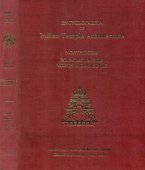Hoysala, Hoysāla: 2 definitions
Introduction:
Hoysala means something in the history of ancient India. If you want to know the exact meaning, history, etymology or English translation of this term then check out the descriptions on this page. Add your comment or reference to a book if you want to contribute to this summary article.
India history and geography
Source: Knowledge Traditions & Practices of India: Architecture (1): Early and Classical Architecture (h)Hoysāla Temples—The kings of the Hoysāla dynasty, who ruled over south Karnataka and for some time over parts of Tamil Nadu as well, contributed immensely to temple art and architecture. Their very unique star-shaped temples, mostly built of soft soap stone, are profusely decorated with hundreds of minute sculptures. The most important Hoysāla temples are at Belur (constructed in 1117), Halebid (its construction commenced in 1118) and Somanathapura (13th century).

The history of India traces the identification of countries, villages, towns and other regions of India, as well as mythology, zoology, royal dynasties, rulers, tribes, local festivities and traditions and regional languages. Ancient India enjoyed religious freedom and encourages the path of Dharma, a concept common to Buddhism, Hinduism, and Jainism.
Languages of India and abroad
Kannada-English dictionary
Source: Alar: Kannada-English corpusHoysaḷa (ಹೊಯ್ಸಳ):—[noun] = ಹೊಯಿಸಳ [hoyisala].
Kannada is a Dravidian language (as opposed to the Indo-European language family) mainly spoken in the southwestern region of India.
See also (Relevant definitions)
Full-text: Somala, Huyasala, Hovisala, Kailasanatha, Hosala, Yadava, Kuduru, Hosur, Herur, Taramanagalam, Gavunda, Nagacandra, Rangamandapa, Kuruvatti, Byahatti, Ranganathaswamy, Kulottunga.
Relevant text
Search found 17 books and stories containing Hoysala, Hoysāla, Hoysaḷa; (plurals include: Hoysalas, Hoysālas, Hoysaḷas). You can also click to the full overview containing English textual excerpts. Below are direct links for the most relevant articles:
Later Chola Temples (by S. R. Balasubrahmanyam)
Introduction < [Chapter XVIII - Chola-Hoysala Phase]
Chapter XV - Rajendra III (A.D. 1246 to 1279/80)
Temples in Srirangam < [Chapter XVIII - Chola-Hoysala Phase]
The history of Andhra country (1000 AD - 1500 AD) (by Yashoda Devi)
Part 31 - Allutikka (A.D. 1248-1272) < [Chapter XX - The Telugu Cholas (Chodas)]
Part 30 - Tikka I (A.D. 1209-1248) < [Chapter XX - The Telugu Cholas (Chodas)]
Part 24 - The Telugu Cholas of Nellore (A.D. 1100-1350) < [Chapter XX - The Telugu Cholas (Chodas)]
Hoysala Bequest To Indian Art < [January-February, 1930]
Reviews < [November-December 1934]
Somapalle Temple < [July – September, 1981]
Temples in and around Madurantakam (by B. Mekala)
Later Cholas (in Chengalpattu) < [Chapter 1 - Historical Backdrop]
Hoysalas and the Muslim Invasion < [Chapter 1 - Historical Backdrop]
Eastern Ganga Interlude at Kanchi < [Chapter 1 - Historical Backdrop]
Middle Chola Temples (by S. R. Balasubrahmanyam)
Temples in Tiruvasi < [Aditya I]
Temples in Sutturu < [Chapter IV - Temples of Rajendra I’s Time]
Temples in Mahadanapuram < [Chapter IV - Temples of Rajendra I’s Time]
Early Chola Temples (by S. R. Balasubrahmanyam)
Temples in Kamarasavalli < [Chapter IV - Temples of Sundara Chola’s Time]
Temples in Nallur < [Chapter X - Historical Survey]
Related products
